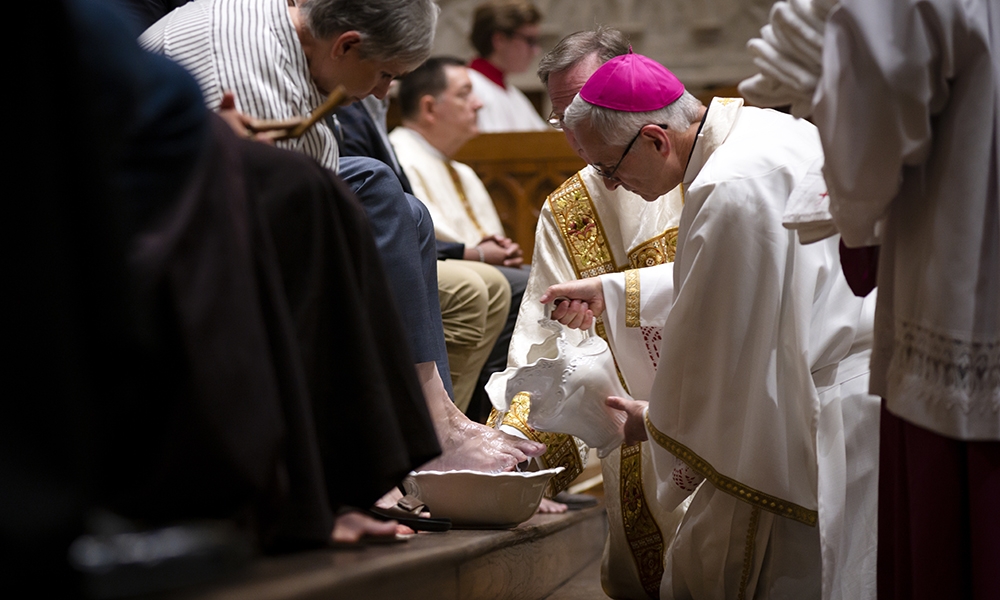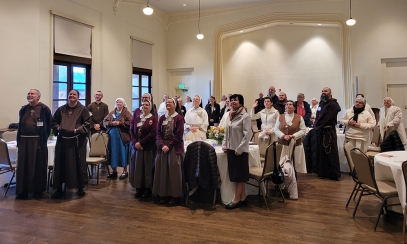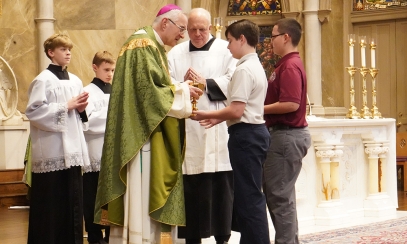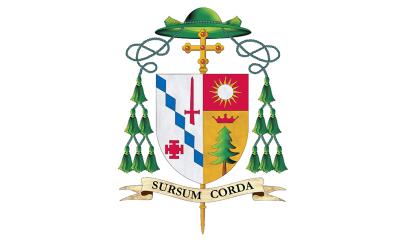
Gratitude and appreciation for the Eucharist and the priesthood
On April 17, the bishop marked Holy Thursday at the Cathedral of St. Paul. The complete text of his homily follows herein.
On April 17, the bishop marked Holy Thursday at the Cathedral of St. Paul. The complete text of his homily follows herein.
My sisters and brothers, tonight, we step into the Cenacle, the Upper Room with Jesus and His Apostles. The air is hushed. The room is dimly lit, and in the stillness of that holy night, Jesus bends low and does something unexpected: He washes feet.
He kneels before the disciples—the Teacher before His students, the Master before His servants—and washes their dusty, calloused feet. And then He tells them, “I have given you a model to follow, so that as I have done for you, you should also do.” (John 13:15)
This is not just a moment of service. It is a revelation.
In that single gesture, Jesus gives us the key to understanding both the “Eucharist” and the “priesthood.” The Eucharist is not simply a meal—it is a sacrifice. The priesthood is not a position—it is a gift of self.
“What return can I make to the Lord for all the good He has done for me?” (Psalm 116:12)
The Psalm tonight asks a simple yet powerful question: “How shall I make a return to the Lord for all the good He has done for me?” or “How can I repay the Lord for all His goodness to me?” And the answer immediately follows: “The cup of salvation I will take up; and I will call upon the name of the Lord.” (Psalm 116:12-13)
That cup—the same one Jesus raised at the Last Supper—is not only a symbol but the real and living presence of His self-gift. “This is My Body, that is for you… This cup is the new covenant in My blood.” (1 Cor 11:24-25)
Here, St. Paul is not recounting a nice tradition. He is passing on the very mystery of our faith, which is what the Church has always called the “source and summit” of the Christian life: the “Eucharist.”
As Pope Benedict XVI once said: “The Eucharist is not a thing. It is not a rite. It is the person of Jesus Himself, Who gives Himself to us completely.”
And Jesus gives Himself so that we might learn to give ourselves in return not just to Him but to one another. “As I have done for you…”
The priesthood: gift and mystery
Tonight, we also celebrate the institution of the priesthood. We do not gather around a table of memory but an altar of sacrifice because through the hands of the priest, Christ continues to act and His one sacrifice is made present again. He continues to wash, to bless, to feed, to heal.
St. John Paul II, in his deep love for the priesthood, once wrote: “The priest is not his own. He is the man of the Eucharist.”
Priests are ordained not for themselves but for service to the People of God. The priesthood exists to bring the Eucharist to the world – the very Bread of Life—to carry out what Christ began on Holy Thursday.
Yes, the priest breaks the bread, but first, he must be broken with Christ. He lifts the chalice, but first, he must pour himself out in love. As Pope Francis often reminds us: “A shepherd must smell like the sheep.”
In that Upper Room, Jesus showed us what this means not in words but in an unusual gesture with water and a towel. That is the “model” He gives: not power and lording it over everyone but service, not privilege and exclusivity but sacrifice.
“This day shall be a memorial feast for you” (Exodus 12:14)
The first reading from Exodus roots us in the Passover, the great act of deliverance when the blood of the lamb from their Seder meal was sprinkled on the lintels so that those who observed the Lord’s command would be saved from death. That moment foreshadowed what Christ fulfilled on this night: “He becomes our Lamb,” our deliverance, our new and eternal covenant.
The Mass is not merely a remembrance. It is a participation in that saving act. Every time we gather, the Lamb is offered not in repetition but making present the one sacrifice of Christ which has an eternal quality so that the fruits of His Passion may be poured out anew in our time and everywhere.
When we come to the altar, we do not come as passive spectators but as grateful participants. We come to say, “Thank You.”
Pope Francis said it this way: “The Eucharist is not a prize for the perfect but a powerful medicine and nourishment for the weak.”
So, we come—weak, wounded, broken, in need—and Christ kneels before us still. He washes. He feeds. He forgives. And our only response is: “Thank you!”
Gratitude becomes imitation
But what then? What do we do with this gift? Jesus tells us plainly: “As I have done for you, you should also do.” If we have been fed, then we must feed others. If we have been forgiven, then we must forgive. If we have been served, then we must serve.
That is the heart of the Eucharist. That is the calling of every priest and, in truth, every Christian. We are to become what we receive—"living tabernacles” of Christ's mercy and love for others, for the world.
Conclusion: a night of profound thanks
Tonight is not only holy, it is deeply personal. It is Jesus saying to us, “This is My Body, for you.” It is Jesus kneeling before us, showing us what love looks like. It is Jesus saying to every priest, “Do this in memory of me.” And to all of us, “Go and do likewise.”
With grateful and bountiful hearts, we receive. With joyful hearts, we live the Eucharist. With appreciative hearts, we honor our priests and pray for them to remain faithful to their calling, steadfast in moments of adversity and grateful in the gift they represent.
Tonight, in our quiet moments of prayer, as we join our hearts with Jesus, we open our hearts to His, expressing our joy and gratitude, our wounds and hurts, and beg once again, “Lord Jesus, as You have done for me, help me to do for others.” Amen.



